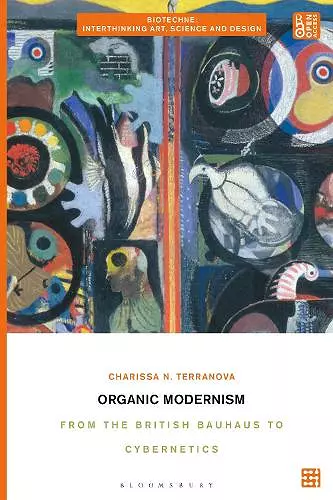Organic Modernism
From the British Bauhaus to Cybernetics
Dr Charissa N Terranova author
Format:Hardback
Publisher:Bloomsbury Publishing PLC
Published:28th Nov '24
Currently unavailable, and unfortunately no date known when it will be back

The book traces the collaborations of organicist artists, scientists, and designers in the UK across the 20th-century, revealing how the original Bauhaus ideal of interdisciplinary unity evolved into cybernetics, epigenetics, and second-order cybernetics in art and design in the 1970s.
When artists, scientists, and designers unite they create new ways of thinking and alternative paths to problem solving.
The first book to trace the story of British "organic modernism", this ground-breaking open access study tells the story of a collective culture of artists, scientists, and designers in 20th century united by a holistic understanding of the organic world and devoted to collaboration, cooperation, and cross-pollination of the arts and biological sciences.
Tracing how artists, scientists, and designers cooperated in various capacities from the Great Depression to postwar cybernetics, this book follows the evolution of philosophical organicism from the British Bauhaus, modern architecture, and surrealism; through to post-war socialism, the welfare state, epigenetics, biology-based art exhibitions; robotic art and design, cybernetics and ecology in art. Reacting against blunt reductionism, organic modernists implemented organicist and emergentist philosophies in scientific labs, design studios, and art ateliers, embracing complexity to solve problems in various scales and arenas, from cells to socialism. Their actions offer a template for finding meaningful agency and problem solving in today's world fraught by global climate disaster, ever-expanding economic inequalities, and backsliding democracy
A sequel to Terranova's Art as Organism: Biology and the Evolution of the Digital Image (2016), Organic Modernism reveals the biological roots of cybernetics in the British context.
The ebook editions of this book are available open access under a CC BY-NC-ND 4.0 licence on bloomsburycollections.com. Open access was funded by the Edith O'Donnell Institute of Art History.
A brilliant transdisciplinary study, Terranova’s book invites us to explore the history of modernism in relation to systems thinking. Charting mutations of ideas in aesthetics, science, and politics, it shows how notions of complexity developed before the digital age, at the confluence of art and biology. * Cristina Albu, Associate Professor of Contemporary Art History and Theory, Department of Art and Art History, University of Missouri, USA *
Invaluably tracing the origins of philosophical organicism in interwoven communities of art, science, design, and socialist politics in the early 20th century, Terranova excavates a germinal educational model for our own ecologically fragile moment. * Christine Filippone, Professor of Art History, Millersville University of Pennsylvania, USA *
A historical account that is also forward-looking, this book is a timely reintroduction to and redeployment of a modernist worldview that favors progressive-minded complexity over the refinements of reductionism. * Dawna Schuld, Associate Professor, Modern and Contemporary Art History, Academy for the Visual and Performing Arts, Texas A&M University, USA *
ISBN: 9781350227538
Dimensions: 236mm x 158mm x 22mm
Weight: 777g
304 pages